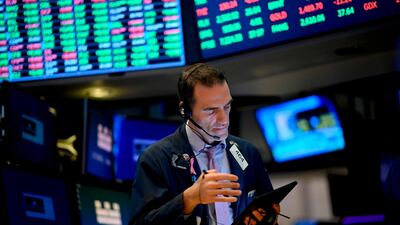As a technology-driven rally brings US stock indexes within striking distance of fresh records, concerns that big names are over-extended and that new regulation might be coming have some investors diversifying beyond the rally leaders.
The S&P 500's five biggest companies, Apple, Microsoft, Amazon.com, Alphabet and Facebook now account for 28 per cent of the index's weighting and have been responsible for 25 per cent of its earnings, Goldman Sachs said earlier this month.
On average, these tech and internet-driven stocks have gained 49.23 per cent this year, compared to a 7 per cent gain for the S&P 500 - and are up 9.6 per cent on average since September 21, versus 6.6 per cent for the S&P 500. They are expected to report strong third-quarter earnings in coming weeks, proving their mettle in a year when the coronavirus pandemic fueled a work-from-home economy while devastating companies linked to sectors like travel, restaurants, and fossil fuels.
Still, some worry that mega-cap tech companies are exposed to factors that may cut their allure in the months ahead. Being long technology is the most crowded trade of all time, according to a recent Bank of America fund manager survey.
"It's all about trying not to have all your eggs in one basket," said Laura Kane, head of Americas thematic investing at UBS Global Wealth Management. "It's about trimming certain exposures and rotating into something else."
UBS analysts have recommended diversifying out of mega-cap tech stocks on signs of an economic recovery and climbing valuations. They urge rebalancing into US semiconductors, which are more sensitive to economic recovery, as well as emerging market value stocks and UK-based equities.
Societe Generale analysts also recently cited a challenging regulatory environment as one reason to diversify out of US tech shares and into Asian ones and European stocks.
Regulatory concerns have heightened following a scathing report detailing market power abuses by Google, Apple, Amazon and Facebook issued earlier this month by the US House Judiciary Committee's antitrust panel. The report has raised concerns that tough new rules and stricter enforcement for big tech companies will follow should Democratic presidential candidate Joe Biden win the White House.
A potential breakthrough in the search for a Covid-19 vaccine also could also spur bets on shares of economically sensitive value and cyclical stocks that may benefit from a stronger economic recovery, potentially dimming the appeal of tech, Soc Gen analysts said.
The median 12-month forward price-to-earnings ratio for the Big 5 tech stocks is 31, while the S&P 500 trades at a 12-month forward PE ratio of 22, according to Refinitiv. Still, they are not as extended as in the dotcom period, with overall profitability, dividends and balance sheet strength in much better shape than 20 years ago.
Companies investors will be watching next week as they report third-quarter results include Netflix on Tuesday, Tesla and Verizon Communication on Wednesday, and Intel on Thursday. Apple, Amazon, Alphabet, Microsoft and Facebook report the following week.
Many investors still see the big tech names, with their strong balance sheets and financial results, as havens as coronavirus cases continue to climb and the economy struggles with a lack of new fiscal stimulus.
"These companies deliver powerful profits," said Jack Ablin, chief investment officer at Cresset Wealth Advisors. "People have to keep in mind that the five largest tech companies make more in earnings than the entire Russell 2000 combined, so this isn't the internet bubble."
It might be a good idea to trim some tech exposure if the position has gotten too overweighted, but the sector's gains are largely being driven by fundamentals, said Michael Farr, president of Farr, Miller & Washington.
To rotate out of tech because of big gains and some recent volatility would be "a suckers' trade", he added. "Reports of their demise have been greatly exaggerated," he said of the big tech stocks.

